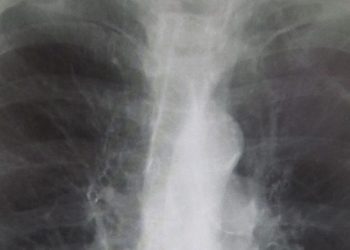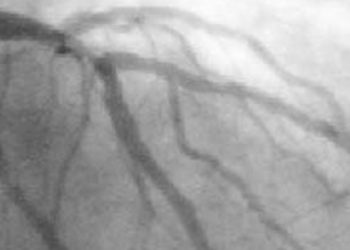Paradoxical response to beta-2 agonists found in African-Americans, linked to morbidity
1. A paradoxical response to beta-2 (β2)-agonists (causing bronchoconstriction rather than bronchodilation) was seen in 5% of former and current smokers, with twice as many African-American patients as white patients affected.
2. The paradoxical response was significantly associated with African-American ethnicity, less emphysema, and increased airway wall thickness. It was also independently associated with worse dyspnea and worse functional capacity as well as being a greater predictor of COPD-related mortality.
Evidence Rating Level: 2 (Good)
Study Rundown: Chronic Obstructive Pulmonary Disease (COPD) is characterized by airflow obstruction that can show an improvement in lung function in response to β2-agonists and anticholinergic bronchodilators. However, a paradoxical response to β2-agonists causing bronchoconstriction and respiratory distress has been reported in some patients. The authors of this study sought to assess the prevalence of a paradoxical response to β2-agonists in current and former smokers with and without COPD, and its association with radiological phenotypes and clinical outcomes.
The results revealed that a paradoxical response occurred in 5% of the study population, with a similar frequency seen in patients with COPD and smokers without airflow obstruction. Additionally, the frequency in African-Americans was double that of white patients. Paradoxical response was also significantly associated with less emphysema, increased airway wall thickness The response was also linked with worse dyspnea and worse functional capacity as well as being a greater predictor of COPD-related mortality.
Click to read the study, published today in The Lancet Respiratory Medicine
Relevant Reading: Bronchodilator reversibility in chronic obstructive pulmonary disease: use and limitations
In-Depth [retrospective cohort]: 9,986 (96%) of 10,364 non-Hispanic white and African-American current and former smokers aged 45-80 years from the COPDGene study population were included in the study. Participants were divided into two groups based on a paradoxical response, which was defined as at least a 12% and 200mL reduction in forced expiratory volume in 1 sec (FEV1), or forced vital capacity (FVC), or both, after administration of 180 μg of salbutamol, a short-acting β2-agonist. Patients were assessed for dyspnea using the Modified Medical Research Council (MMRC) dyspnea score, functional capacity as measured by a standardized 6 minute walking test, and by the Body Mass Index, Airflow Obstruction, Dyspnea, and Exercise Capacity (BODE) index to predict COPD-related mortality rate. Volumetric CT scans assessed for emphysema and gas trapping. Analyses were done for the entire study population and separately for patients with COPD and smokers without airflow obstruction.
A paradoxical response was observed in 453 (5%) of 9,986 patients overall, along with 198 (4%) of 4,439 patients with COPD and 255 (5%) of 5,547 smokers without airflow obstruction. Additionally, a paradoxical response occurred twice as frequently in African-Americans (227 [7%] of 3,282) vs. white patients (226 [3%] of 6,704, p<0.0001). The response was found to be independently associated with a lower MMRC score (adjusted β regression coefficient 0.12, 95% Confidence Interval [CI] 0.00 to 0.24; p=0.05), shorter 6 minute walking test (-45.8, -78.5 to -13.2; p=0.006), a higher BODE index (β 0.31, 0.19 to 0.43; p<0.0001), and a greater frequency of severe exacerbations (incidence risk ratio 1.35, 95% CI 1.00-1.81; p=0.048). African-American ethnicity (adjusted odds ratio 1.89, 95% CI 1.50-2.39; p<0.0001), less emphysema (0.96, 0.92-0.99; p=0.023), and thicker airways (1.04, 1.01-1.08; p=0.023) were also significantly associated with a paradoxical response.
More from this author: Beta-blockers ineffective for treating combined heart failure and atrial fibrillation, Collaborative care model reduces depression in lung cancer patients [SMaRT Oncology-3 Trial], New dengue fever vaccine effective in phase 3 trial, Insulin pumps more effective than multiple daily injections in type II diabetics [OpT2mise trial], Heart attack hospitalization rate in China quadruples from 2001-2011
Image: PD
©2012-2014 2minutemedicine.com. All rights reserved. No works may be reproduced without expressed written consent from 2minutemedicine.com. Disclaimer: We present factual information directly from peer reviewed medical journals. No post should be construed as medical advice and is not intended as such by the authors, editors, staff or by 2minutemedicine.com. PLEASE SEE A HEALTHCARE PROVIDER IN YOUR AREA IF YOU SEEK MEDICAL ADVICE OF ANY SORT.




![Shorter moxifloxacin-containing regimens ineffective for treating TB [REMoxTB trial]](https://www.2minutemedicine.com/wp-content/uploads/2014/09/TB-original-e1591582219420-75x75.jpg)

